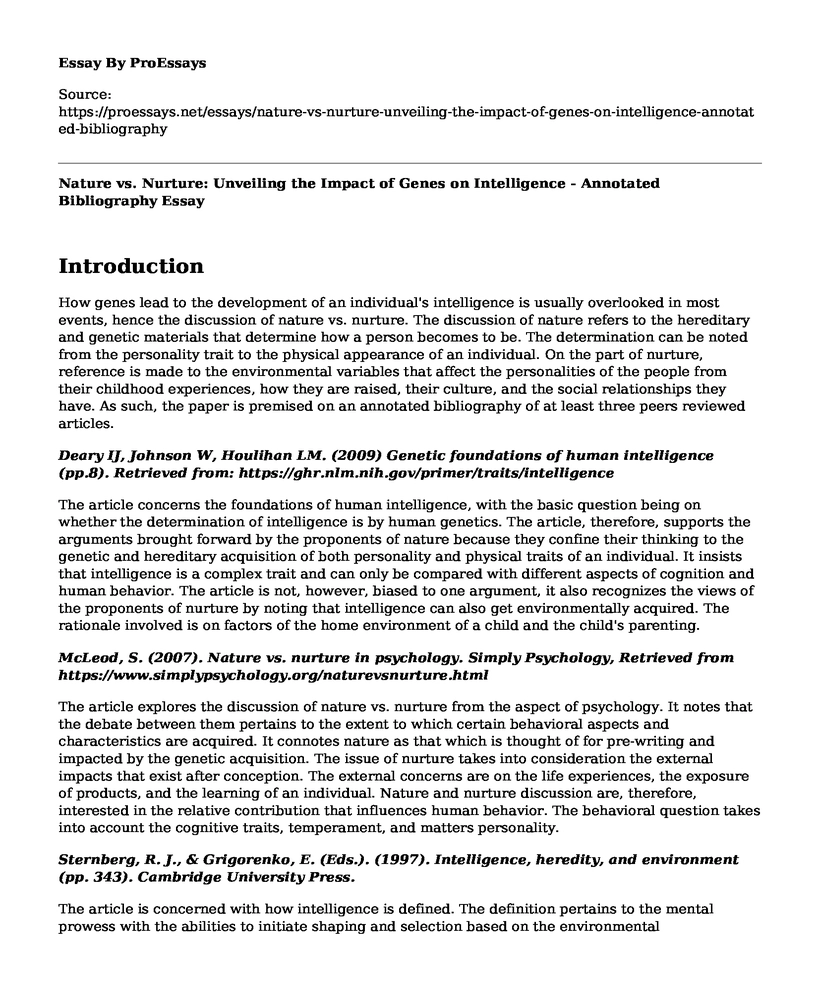Introduction
How genes lead to the development of an individual's intelligence is usually overlooked in most events, hence the discussion of nature vs. nurture. The discussion of nature refers to the hereditary and genetic materials that determine how a person becomes to be. The determination can be noted from the personality trait to the physical appearance of an individual. On the part of nurture, reference is made to the environmental variables that affect the personalities of the people from their childhood experiences, how they are raised, their culture, and the social relationships they have. As such, the paper is premised on an annotated bibliography of at least three peers reviewed articles.
Deary IJ, Johnson W, Houlihan LM. (2009) Genetic foundations of human intelligence (pp.8). Retrieved from: https://ghr.nlm.nih.gov/primer/traits/intelligence
The article concerns the foundations of human intelligence, with the basic question being on whether the determination of intelligence is by human genetics. The article, therefore, supports the arguments brought forward by the proponents of nature because they confine their thinking to the genetic and hereditary acquisition of both personality and physical traits of an individual. It insists that intelligence is a complex trait and can only be compared with different aspects of cognition and human behavior. The article is not, however, biased to one argument, it also recognizes the views of the proponents of nurture by noting that intelligence can also get environmentally acquired. The rationale involved is on factors of the home environment of a child and the child's parenting.
McLeod, S. (2007). Nature vs. nurture in psychology. Simply Psychology, Retrieved from https://www.simplypsychology.org/naturevsnurture.html
The article explores the discussion of nature vs. nurture from the aspect of psychology. It notes that the debate between them pertains to the extent to which certain behavioral aspects and characteristics are acquired. It connotes nature as that which is thought of for pre-writing and impacted by the genetic acquisition. The issue of nurture takes into consideration the external impacts that exist after conception. The external concerns are on the life experiences, the exposure of products, and the learning of an individual. Nature and nurture discussion are, therefore, interested in the relative contribution that influences human behavior. The behavioral question takes into account the cognitive traits, temperament, and matters personality.
Sternberg, R. J., & Grigorenko, E. (Eds.). (1997). Intelligence, heredity, and environment (pp. 343). Cambridge University Press.
The article is concerned with how intelligence is defined. The definition pertains to the mental prowess with the abilities to initiate shaping and selection based on the environmental requirements. The behavior that comes with the intelligence may change based on the environmental context but the mental possession that underlies the behavior remains constant. The application ability of the behavior by an individual may also differ but their premise is on meeting the external correspondence to the world coupled with internal clarity amongst knowledge and varying belief structures.
Conclusion
In summary, the three articles advance the discussion of nature vs. nurture. They all share on a premise of nature getting inclined on genetics and matters hereditary while nurture being underlines on the environmental aspects that affect the personality and personal characteristics of a person. As such, they can be best used in contributing towards the nature vs. nurture debate to reach a formidable ground.
Cite this page
Nature vs. Nurture: Unveiling the Impact of Genes on Intelligence - Annotated Bibliography. (2023, Apr 07). Retrieved from https://proessays.net/essays/nature-vs-nurture-unveiling-the-impact-of-genes-on-intelligence-annotated-bibliography
If you are the original author of this essay and no longer wish to have it published on the ProEssays website, please click below to request its removal:
- Course Work Example on Hormones
- Research Paper Example on Female Reproductive Structures
- Essay Sample on Bird Migration and Technology
- Safety of Genetically Engineered Food Crops - Research Paper
- Essay Sample on Changing Human-Environment Interactions: Impact on Life
- Essay Sample on Humans-Environment Interactions: A Constant Struggle for Survival
- Free Essay Sample on Natural Capital: Essential for Human Survival







